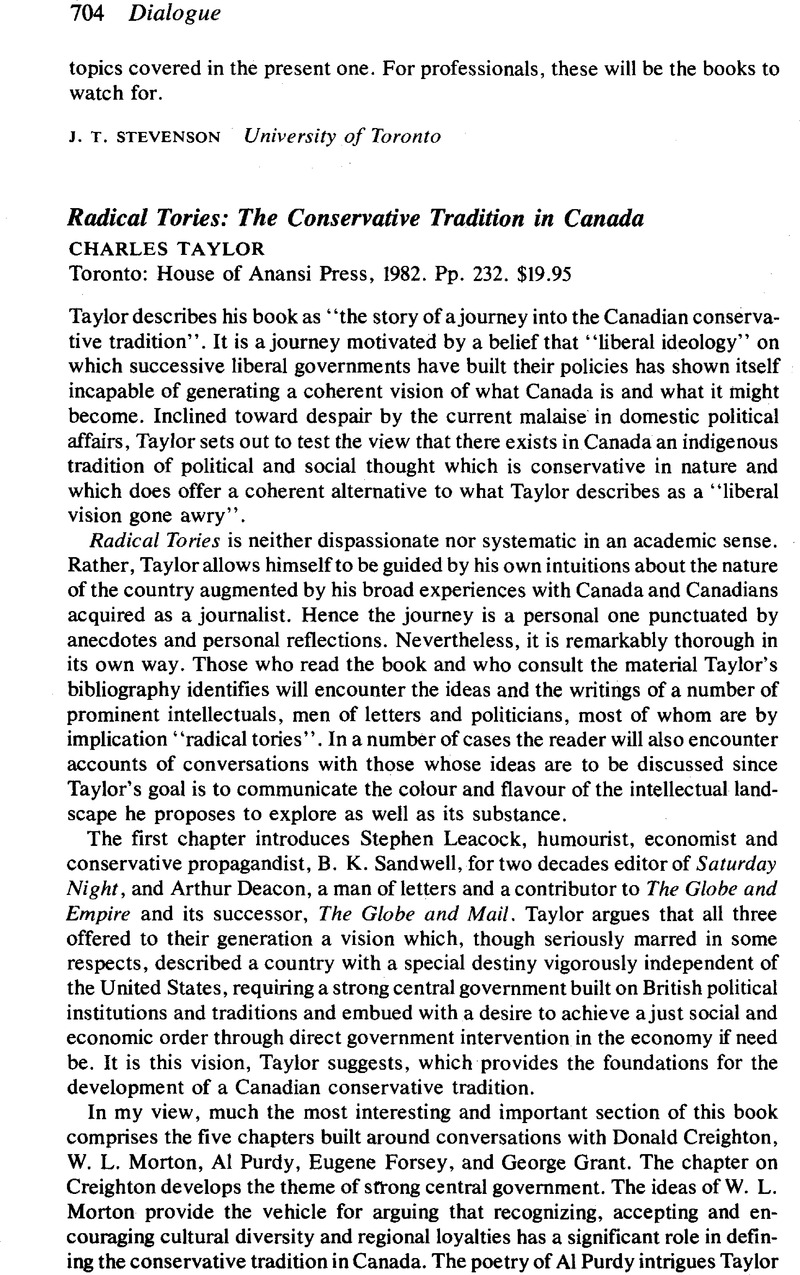No CrossRef data available.
Article contents
Radical Tories: The Conservative Tradition in CanadaCharles Taylor Toronto: House of Anansi Press, 1982. Pp. 232. $19.95
Published online by Cambridge University Press: 05 May 2010
Abstract

- Type
- Book Reviews/Comptes rendus
- Information
- Dialogue: Canadian Philosophical Review / Revue canadienne de philosophie , Volume 23 , Issue 4 , December 1984 , pp. 704 - 711
- Copyright
- Copyright © Canadian Philosophical Association 1984
References
1 For example, Taylor identifies an article by George Grant entitled “An Ethic of Community” published in 1961 by the University of Toronto Press in a volume entitled Social Purpose for Canada, edited by Michael Oliver. The volume was funded by a West Coast foundation devoted to the encouragement of socialism in Canada. It explores a variety of ideas many, if not most, of which are quite consistent with Taylor's account of the conservative tradition. One of those essays is written by Trudeau and defends regionalism and provincial “sovereignty”, arguing that a division of powers is an essential feature of Canadian political life, and should be respected by socialists active in politics at the national level as compatible with the development of a socialist Canada.
2 Some of what I argue below suggests that the Canadian constitution does have a distinctive shape because of the influence of the kinds of values Taylor points to. An example of this is the importance the constitution gives to group rights.
3 Michael McDonald suggests that this question has a key role to play in the assessment of systems of values, as well as theories, which imply a particular system of values in “Ideology and Morality in Hard Times” contributed to a chapter on “Philosophy and the Resolution of Moral Issues” in Cragg, Wesley, ed., Contemporary Moral Issues (Toronto: McGraw-Hill Ryerson, 1983), 608Google Scholar.
4 This question is intriguing in light of the fact that a number of the people Taylor identifies as red tories have at one time or another found liberal or socialist circles more congenial than conservative ones. Oliver, ed., Social Purpose for Canada (see footnote 1 above), is relevant in this context as well.
5 French, Stanley, ed., Confederation (Montreal: Canadian Philosophical Association, 1979)Google Scholar, is a good example of a recent work reflecting widespread interest on the part of Canadian philosophers in a variety of issues whose resolution would require assessing the nature and coherence of the values which Taylor identifies as central to the Canadian conservative tradition. Other examples of recent publications in the same vein are Copp, David and Wendell, Susan, eds., Pornography and Censorship (Buffalo, NY: Prometheus Books, 1983)Google Scholar, and Narveson, Jan, ed., Moral Issues (Oxford: Oxford University Press, 1983)Google Scholar.
6 Rawls attempts to identify and account for key features of liberalism in his Tanner lectures. The orchestra example used below is drawn from those lectures. Rawls uses the example to illustrate the function and merit of co-operation for individuals in the pursuit of their goals.
7 That the view being set out by Taylor is incompatible with the view of the nature of moral obligation which develops from theories which emphasize individual moral autonomy is argued by Jan Narveson in “Moral Philosophy, What It Is and Why It Matters” (Narveson, ed., Moral Issues, 474) and commented on by McDonald (ibid., 608).
8 A sustained argument to this effect is developed by Jack Stevenson in “Aboriginal Land Rights in Northern Canada” (ibid., 441).
9 For a discussion which bears directly on these issues see Charles Taylor's discussion of “Atomism” in Kontos, A., ed., Powers, Possessions and Freedom (Toronto: University of Toronto Press, 1979), 39Google Scholar. See also McDonald, “Ideology and Morality in Hard Times”.
10 George Grant's work is clearly relevant here. Recently two books have appeared on this topic: Maclntyre, Alistair, After Virtue (Notre Dame, IN: University of Notre Dame Press, 1981)Google Scholar, and Sandel, Michael J., Liberalism and the Limits of Justice (Cambridge: Cambridge University Press, 1982)Google Scholar.
11 Michael McDonald would seem to adopt such a view in “Ideology and Morality in Hard Times”.




